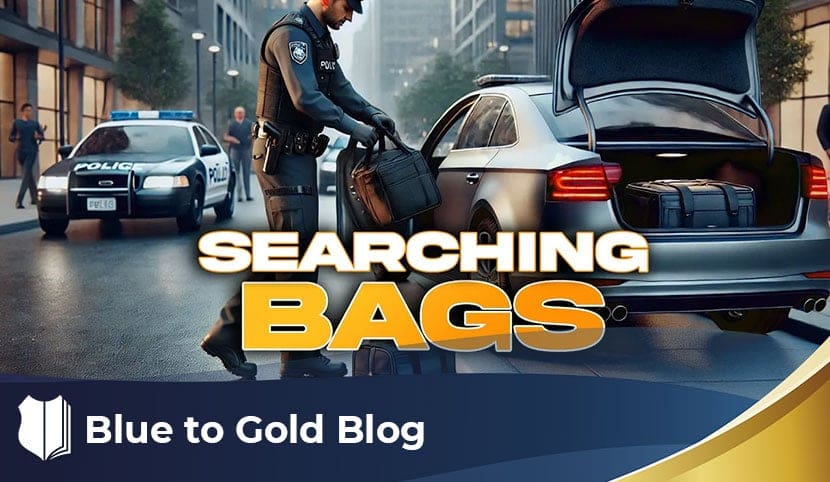So, I received a question from a cop in Texas. He says, “The discussion came up during our K9 training group about being able to search a person’s personal property—backpack, purse, etc.—if it was removed from the vehicle prior to the free-air sniff and alert by the canine. My understanding is that if the property was removed prior to the free-air sniff and alert, you would have to obtain a search warrant to search it since probable cause was established only after the property was removed. Some in the group believe that the property could be searched under the Carroll Doctrine or motor vehicle exception because it had just been in the vehicle and was removed shortly before the alert. Can you provide any case law for a situation like this?”
Okay, so the answer is: I do not teach searching this under the motor vehicle exception. The problem is that’s not what the motor vehicle exception is. The motor vehicle exception requires probable cause that there’s evidence in the vehicle, and the place searched must be one where that evidence could reasonably be found. But it’s in the vehicle. The motor vehicle exception does not pertain to passengers, right? People are not containers, so we know that. The motor vehicle exception applies to the vehicle, not the person.
A good case for this is Cleveland v. State, a case out of the Indiana Court of Appeals in 2019. Let me read a quote from it that might help. It says, “Here, it is undisputed that the officers had the authority to invoke the automobile exception to search the Ford Explorer and its contents therein. However, Cleveland, our suspect, contends that the automobile exception did not extend to his person or his gold bag because he had left the vehicle. What is most pertinent to our analysis is the fact that Cleveland and his gold bag were inside the vehicle at the time the officer suspected the vehicle of containing contraband. By virtue of the bag’s presence inside the vehicle, the officers had the constitutional authority to search it from the outset.”
Okay, so that’s the key point. When we go back to our officer’s scenario with the K9 alert: if the officers allowed the suspect to bring the bag out and detain him outside the vehicle, I think the better course of action would be to either get consent or get a search warrant. If the dog alerts on the bag, and you have reasonable suspicion, you can ask for consent to search the bag. You could also get a warrant to search it. You may be able to conduct a search incident to arrest, but that would be tricky because the person is probably not near the bag at the time of arrest.
If you’re trying to conduct a search incident to arrest, you’re probably playing games, honestly. You would likely have to move him near the bag and then arrest him in order to invoke the search incident to arrest doctrine, which I don’t think would work here.
But at the end of the day, I personally wouldn’t search the bag under the motor vehicle exception.
The officer also asks, “What about just ordering them to keep the bags in the car?” Well, first of all, that could be tricky if they exit the vehicle and try to walk away. You would have to contain them. But generally speaking, if you stop a vehicle and order the occupants to get out, you can do that. Pennsylvania v. Mimms allows you to order the driver out of the car, and Maryland v. Wilson applied that same doctrine to passengers. So, you can get the occupants out, and if they want to bring their bag or purse, my advice is, generally speaking, don’t allow it. But not because you’re trying to “game the system” to get probable cause on the bag. Maybe that’s part of it, but the real reason is for safety.
The Court has told us in Mimms and Wilson that ordering people to exit the car or to stay in the car is a de minimis intrusion, meaning it’s not that much more intrusive than the stop itself. If that logic applies to the occupants, then how does it not apply to the bags? Isn’t it also de minimis for everyone’s safety to just say, “Hey, would you mind leaving the bag in the car?” Doesn’t that make sense? Isn’t it the least intrusive way to handle their property? You can also rely on good old-fashioned Terry v. Ohio to justify your actions in the interest of safety.
In short, the intrusion of asking them to leave the bag in the car would be minimal. And there’s a legitimate safety concern under Terry.
Great questions, keep them coming! Go to ludicol.com/show, check out our show page, and ask your questions there. I’ll answer them in this format. If you have a question for me and want to run something by me offline, I’m happy to provide legal education, but please note I won’t give legal advice or become your attorney. That’s for cops only, just so you know—I don’t do that for the general public.
So, keep the questions coming. Until next time, my friends, stay safe.










